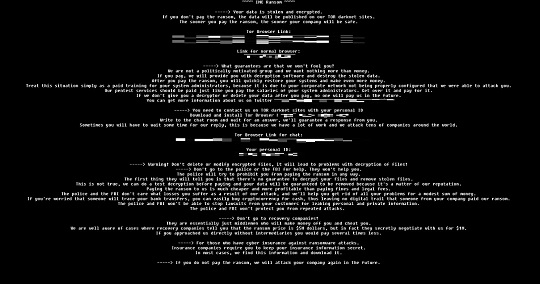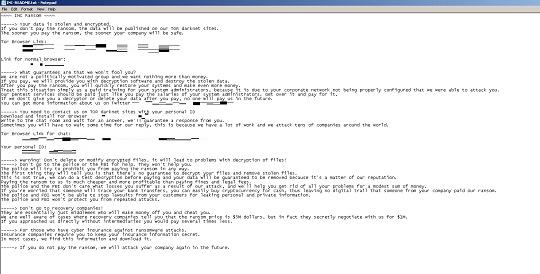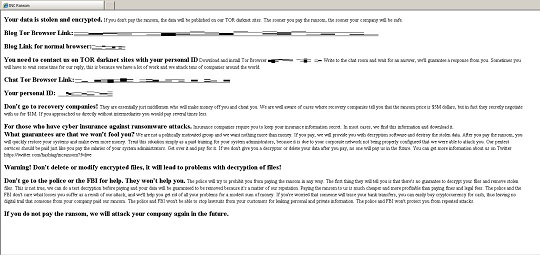Ransom.Win32.RANINC.SMYXECXT
Ransom:Win32/Inc.MA!MTB (MICROSOFT)
Windows


Threat Type: Ransomware
Destructiveness: No
Encrypted: No
In the wild: Yes
OVERVIEW
This Ransomware arrives on a system as a file dropped by other malware or as a file downloaded unknowingly by users when visiting malicious sites.
It does not have any propagation routine.
It does not have any backdoor routine.
It does not have any information-stealing capability.
It drops files as ransom note. It avoids encrypting files with the following file extensions.
TECHNICAL DETAILS
Arrival Details
This Ransomware arrives on a system as a file dropped by other malware or as a file downloaded unknowingly by users when visiting malicious sites.
Installation
This Ransomware drops the following files:
- %User Temp%\background-image.jpg
- %System%\spool\PRINTERS\00002.SPL
- %System%\spool\PRINTERS\00002.SHD
(Note: %User Temp% is the current user's Temp folder, which is usually C:\Documents and Settings\{user name}\Local Settings\Temp on Windows 2000(32-bit), XP, and Server 2003(32-bit), or C:\Users\{user name}\AppData\Local\Temp on Windows Vista, 7, 8, 8.1, 2008(64-bit), 2012(64-bit) and 10(64-bit).. %System% is the Windows system folder, where it usually is C:\Windows\System32 on all Windows operating system versions.)
It adds the following processes:
- bcdedit.exe /set {default} safeboot network → If --safe-mode parameter is used.
- shutdown.exe -r → If --safe-mode parameter is used.
Other System Modifications
This Ransomware modifies the following registry entries:
HKEY_CURRENT_USER\Software\Microsoft\
Windows\CurrentVersion\Explorer\
CLSID\{645FF040-5081-101B-9F08-00AA002F954E}\DefaultIcon
(Default) = %System%\imageres.dll,-55
(Note: The default value data of the said registry entry is %System%\imageres.dll,-54.)
It changes the desktop wallpaper by modifying the following registry entries:
HKEY_CURRENT_USER\Control Panel\Desktop
Wallpaper = %User Temp%\background-image.jpg
It sets the system's desktop wallpaper to the following image:
- %User Temp%\background-image.jpg

Propagation
This Ransomware does not have any propagation routine.
Backdoor Routine
This Ransomware does not have any backdoor routine.
Rootkit Capabilities
This Ransomware does not have rootkit capabilities.
Process Termination
This Ransomware terminates the following services if found on the affected system:
- sql
- veeam
- backup
- exchange
It terminates the following processes if found running in the affected system's memory:
- sql
- veeam
- backup
- exchange
- java
Information Theft
This Ransomware does not have any information-stealing capability.
Other Details
This Ransomware adds the following registry keys:
HKEY_LOCAL_MACHINE\SYSTEM\{Current Control Set}\
Control\SafeBoot\Network\
dmksvc → If --safe-mode parameter is used
HKEY_LOCAL_MACHINE\SYSTEM\{Current Control Set}\
Control\SafeBoot\Minimal\
dmksvc → If --safe-mode parameter is used
It does the following:
- Empty Recycled Bin
- It enumerates printers in the network to print the ransom note.
- It encrypts fixed, removable, and network drives.
- It adds the following services: → If --safe-mode parameter is used
- Name: dmksvc
- Start Type: AutoStart
- Binary Path: {Malware File Path}\{Malware Filename}
It accepts the following parameters:
- --debug → Display logs within the command prompt.
- --file {File Path} → Encrypts the specified file.
- --dir {Directory Path} → Encrypts the specified directory.
- --sup → Uses the Windows Restart Manager API to close processes or shut down Windows services that may be keeping a file open and preventing encryption.
- --ens → Enumerates available network shares to encrypt.
- --lhd → Encrypt hidden drives.
- --hide → Hide console window.
- --safe-mode → Boots the machine in safe mode.
- --help→ Display help information.
- --kill → Kill process/services by mask.
- --mode → Mode of File Encryption.
- Fast→ Encrypts a fixed value of 1,000,000 bytes and skips a larger bytes.
- Medium → Encrypts a fixed value of 1,000,000 bytes and skips a smaller bytes compared to fast mode.
- Slow → Encrypt the whole file.
It does not exploit any vulnerability.
Ransomware Routine
This Ransomware avoids encrypting files with the following strings in their file path:
- windows
- program files
- program files (x86)
- $RECYCLE.BIN
- appdata
- microsoft sql server
It appends the following extension to the file name of the encrypted files:
- {original file name}.{original extension}.INC
It drops the following file(s) as ransom note:
- {Encrypted Directory}\INC-README.txt

- {Encrypted Directory}\INC-README.html

It avoids encrypting files with the following file extensions:
- .exe
- .msi
- .dll
- .inc
SOLUTION
Step 1
Trend Micro Predictive Machine Learning detects and blocks malware at the first sign of its existence, before it executes on your system. When enabled, your Trend Micro product detects this malware under the following machine learning name:
- TROJ.Win32.TRX.XXPE50FFF082
Step 2
Before doing any scans, Windows 7, Windows 8, Windows 8.1, and Windows 10 users must disable System Restore to allow full scanning of their computers.
Step 3
Note that not all files, folders, and registry keys and entries are installed on your computer during this malware's/spyware's/grayware's execution. This may be due to incomplete installation or other operating system conditions. If you do not find the same files/folders/registry information, please proceed to the next step.
Step 4
Search and delete this file
- %User Temp%\background-image.jpg
- %System%\spool\PRINTERS\00002.SPL
- %System%\spool\PRINTERS\00002.SHD
- {Encrypted Directory}\INC-README.html
- {Encrypted Directory}\INC-README.txt
Step 5
Restore this modified registry value
Important: Editing the Windows Registry incorrectly can lead to irreversible system malfunction. Please do this step only if you know how or you can ask assistance from your system administrator. Else, check this Microsoft article first before modifying your computer's registry.
- In In HKEY_CURRENT_USER\Software\Microsoft\Windows\CurrentVersion\Explorer\CLSID\{645FF040-5081-101B-9F08-00AA002F954E}\DefaultIcon
- (Default) = %System%\imageres.dll,-55
- (Default) = %System%\imageres.dll,-55
Step 6
Delete this registry key
Important: Editing the Windows Registry incorrectly can lead to irreversible system malfunction. Please do this step only if you know how or you can ask assistance from your system administrator. Else, check this Microsoft article first before modifying your computer's registry.
- In In HKEY_LOCAL_MACHINE\SYSTEM\{Current Control Set}\Control\SafeBoot\Network\dmksvc
- In In HKEY_LOCAL_MACHINE\SYSTEM\{Current Control Set}\Control\SafeBoot\Minimal\dmksvc
Step 7
Reset your Desktop properties
Step 8
Scan your computer with your Trend Micro product to delete files detected as Ransom.Win32.RANINC.SMYXECXT. If the detected files have already been cleaned, deleted, or quarantined by your Trend Micro product, no further step is required. You may opt to simply delete the quarantined files. Please check the following Trend Micro Support pages for more information:
Step 9
Restore encrypted files from backup.
Did this description help? Tell us how we did.


